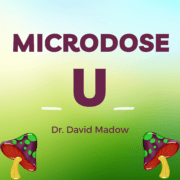Do Not Listen Until New Years Eve
Podcast: Play in new window | Download | Embed
Subscribe: RSS
Welcome to Microdose U! Thanks for being here! You are about to change your life!!!
In order to get the most out of the show, please do these very important things below:
1. Meet up with us over in our new private FACEBOOK group to continue the discussion: https://www.facebook.com/groups/853347769006296/
2. Sign up for the free Microdose U Newsletter and always be up to date!!! https://dave-madow-com.ck.page/a3cbff7dc2
When you sign up for the newsletter, you are automatically enrolled in our drawings for your own Personal Mushroom Journal!
3. Check out our resource page at https://davidmadow.com/your-microdosing-resource-page/
4. Listen to the episode “The Absolute Beginner’s Guide to Microdosing Magic Mushrooms. https://podcasts.apple.com/us/podcast/microdose-u-how-psilocybin-can-rewire-your-brain-from/id1571391272?i=1000615401854
Everything that is shared in this podcast is for informational purposes only. Be aware of all local, state and federal laws and adhere to them accordingly. ONLY use psilocybin in areas where it has been legalized or decriminalized.
Nothing here is to be taken as medical advice. Dr. Dave is sharing his personal story with you. Please contact your healthcare professional to find out if this is right for you.
Dr. Dave may be reached at rundrdave@gmail.com. He is available for one-on-one consultations/coaching.

